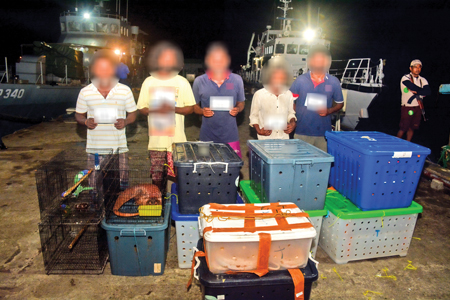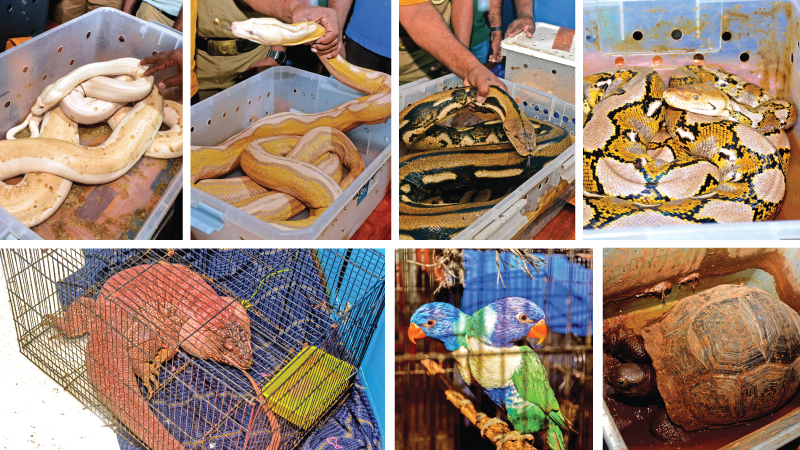 Sri Lanka is a haven for smuggled contraband from gold to narcotics, tobacco products and the list goes but in recent times the authorities have been forced to combat another illicit trade – pythons that are slithering into the country through illicit channels and mainly by air freight.
Sri Lanka is a haven for smuggled contraband from gold to narcotics, tobacco products and the list goes but in recent times the authorities have been forced to combat another illicit trade – pythons that are slithering into the country through illicit channels and mainly by air freight.

Environmentalist Dr. Jagath Gunawardena

Navy spokesman Capt. Gayan Wickramasuriya
Known or unknown to Customs officials, these reptiles mainly from South Eastern Asian countries such as Thailand, Indonesia and Malaysia have entered the Sri Lankan market in what officials describe as a multi-million rupee illicit business often helped with online facilities and in some cases face to face contact between buyer and seller.
The duration or the volume of this of racket is not known to local officials but environmentalists and others believe it is deeply embedded in the country simply because these reptiles enjoy tropical weather and their upkeep has a very minimum expense.
The trading of these foreign pythons as well as other protected foreign species such as exotic birds and even lizards is carried out in a clever and clandestine manner where the officialdom often ends up staring at a blank wall when investigating cases.
However, in the most recent detection, the police raided an up market pet shop at Wattala.
What the police found during the raid carried out on a tip-off were four full grown foreign pythons known as (Ball Pythons and a local crocodile captured from a lake in the dry zone of the country.
Police later transferred the animals to the Dehiwala National Zoo while the suspects were scheduled to be produced before the Wattala Magistrate’s Court.
This is the second known case in less than two months.
Navy detection
 On July 7, the Sri Lanka Navy deployed Coast Guard ship Suraksha seized a local multi-day fishing trawler in the southern waters and apprehended five suspects in connection with the smuggling of several bird and reptile species including 13 foreign pythons.
On July 7, the Sri Lanka Navy deployed Coast Guard ship Suraksha seized a local multi-day fishing trawler in the southern waters and apprehended five suspects in connection with the smuggling of several bird and reptile species including 13 foreign pythons.
This operation was conducted based on a comprehensive information analysis by Naval Intelligence over an extended period, focusing on a smuggling racket of birds and reptiles to the country.
The find on the fishing trawler included 13 pythons, a monitor lizard, one tortoise and three parrots raising concerns over an act of wildlife smuggling.
This is the first detection of this nature known to the Navy who largely concentrate on combatting the smuggling of narcotics and human trafficking on the high seas between the Palk Straits and elsewhere, Navy Spokesman Captain Gayan Wickramasuriya said.
 He said the fishing trawler was escorted to the Galle Habour where officials of the Department of Wildlife Conservation examined the animals and identified them as non-native species to Sri Lanka.
He said the fishing trawler was escorted to the Galle Habour where officials of the Department of Wildlife Conservation examined the animals and identified them as non-native species to Sri Lanka.
It is thought that these animals were to be loaded another boat heading for a Middle East destination and the locals were involved in the transshipment process and nothing else, Capt. Wickramasuriya said.
He said that the Navy conducts operations to combat smuggling of this nature that could harm the country’s ecosystem.
Tip of the iceberg
However, a senior environmentalist said the recent detections by the Navy and the Police were just the tip of the iceberg and there is plenty more to be done if this illicit trade is to be discouraged or outlawed altogether.
Environmentalist Jagath Gunawardene said the Customs authority has a larger role to play in combatting this illicit trade but stops short of blaming them altogether.
Probably, they are in need of more manpower and modern technology if they are to make more detections at the border crossing meaning the Bandaranaike International Airport and other sea entry points into the country and they must work towards this end at the very earliest.
He suggested that a triparte unite made up of the Customs, Police and the Wild Life Department be created and where they could work and cooperate with environmentalists and wild life lovers as a first step in combatting this illicit trade.
 “It is an uphill task altogether but at the same time, it has to be scaled in a way that it is currently being carried out in many developed countries and elsewhere,” Gunawardene said.
“It is an uphill task altogether but at the same time, it has to be scaled in a way that it is currently being carried out in many developed countries and elsewhere,” Gunawardene said.
He said that the smuggled exotic birds, reptiles and animals are mainly for local wealthy wild life collectors while there could also be a few foreign buyers, but at the same time he did not rule out the possibility that some of the selected reptiles may even find themselves on the dishes of up market restaurants.
Foreign wild life species are allowed to be imported into the country only with the approval of the Department of Wild Life Conservation.
Detections in the past have found out that none of the owners was in possession of approval documents which only goes on to suggest the wide capacity of smuggling that is sometimes carried out with errant officials on the take, Gunawardene who is also a lawyer said.
Serious offence
Permission has to be sought under Section 37 of the Fauna and Flora Ordinance from the Wild Life Department if one chooses to maintain an exotic bird, animal or whatever creature or else it is a very serious offence, according Gunawardene.
He said that a State unit known as the Sri Lanka Wild Life Enforcement Network (SLWLEN) is also currently in operation and works towards the same subject.
The Customs authority in the past have made several detections on the illicit import and export of wild life species, but there has never been a known case of pythons being smuggled into the country, a senior Customs official said.
The smugglers are known to use clever tactics and getting at them is a difficult task although we remain on the alert and follow up whatever information that is provided to us, he said.
He also added that limited checking is carried out on flights from Europe and across the Pacific because they are listed in the non-suspicious capacity and rigid checking of their personal baggages could harm the tourist industry.
Meanwhile, Initial police investigations have found out that the pythons were brought into the country through the passenger entry terminal and the person could either be a foreigner or a local.
(Pic: Courtesy Sri Lanka Navy)







